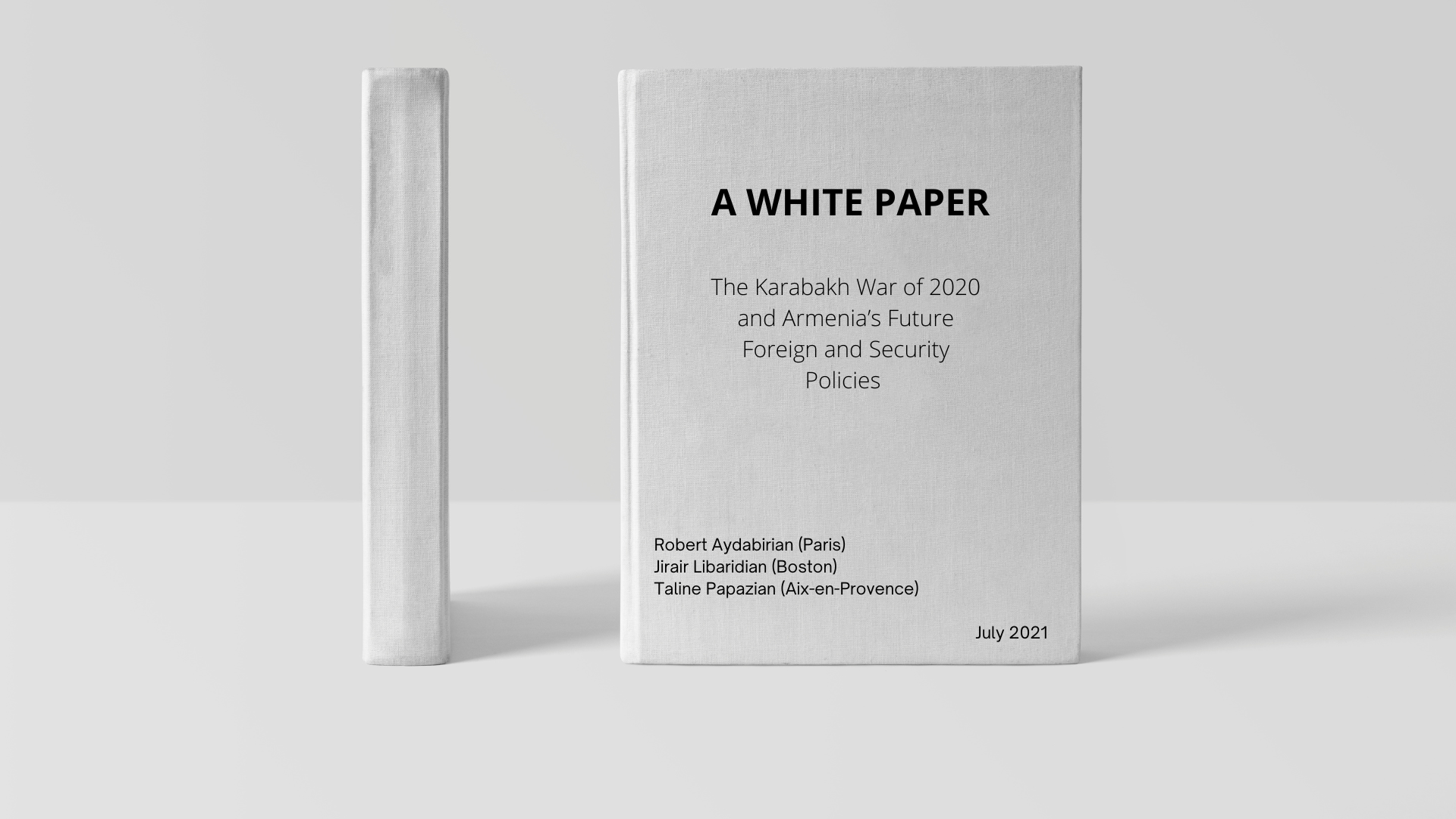
The “White Paper”, published in September 2021 in four languages, is a comprehensive study of Armenia’s strategic thinking and options following the 44-day war of September-November 2020. Written by three knowledgeable individuals, the study also includes a synthesis of the opinions of some 45 Armenian experts and analysts from around the world on the causes, course and consequences of the September 2020 war.
The September 2020 war has highlighted a number of weaknesses in Armenia’s position and policies. It has also prompted the publication of a number of essays and papers analysing these issues, while others offer recommendations for future policy. Now, after eight months of extensive research and consultation, a new study has been published in the form of a White Paper, which explores in detail and in depth the fault lines that led to the war and the defeat in it, and defines the environment in which Armenia now operates at the regional and international levels. The paper also makes recommendations for future choices and reforms.
The White Paper, entitled “The Karabakh War of 2020 and Armenia’s Future Foreign and Security Policies”, is a comprehensive study of these crucial issues for Armenia, Karabakh and the Armenian world. This lengthy study is accompanied by an executive summary, an interactive table of contents, and appendices and annexes that complement the text. It is published in English and Armenian (links below). Translations into French and Spanish are underway. The aim of this document is to offer analyses of past problems and future options in a systematic way, based on rational arguments, and to invite public debate based on facts and critical judgement by separating facts from opinions, sober judgement from prejudices and strategic considerations from ideological constructs. In doing so, the authors hope to encourage public debate on these issues, but also to help those in authority to rethink the issues when formulating policy.
Written by three knowledgeable individuals, the study also includes a synthesis of the opinions of some 45 Armenian experts and analysts from around the world on the causes, course and consequences of the war. The three authors – Taline Papazian (French-Armenian political scientist), Robert Aydabirian, (French-Armenian executive and analyst), and Jirair Libaridian, (retired historian and diplomat) – have all been intimately involved in different ways in the life of Armenia and Artsakh over the past few years, or more.
“An important defining feature of the White Paper is the full transparency we have tried to achieve in order to gain the trust of the readers. We have separated our views from those of the respondents, and we have made known all the available opinions, even if they are different or opposed to ours,” said Taline Papazian, lecturer at the University of Aix-en-Provence and one of the authors.
The first part of the study presents a summary of the spectrum of opinions of 45 experts who responded to a questionnaire sent by the authors on a number of sensitive topics. These opinions are often at opposite ends of the spectrum, reflecting the divided world of Armenians today. The second part includes the authors’ own observations about Armenia and Artsakh today and the factors that Armenia and Armenians need to consider in their foreign and security policy thinking and choices. The authors insist that, more than ever, we must act more wisely and avoid the mistakes of the past. The White Paper has been shared with the executive and legislative leaders of Armenia and Artsakh, the media, research centres, experts and personalities in the Armenian world. It has also been made available to foreign diplomats in Yerevan.
“What we have produced is an analytical document,” said another of the authors, Robert Aydabirian from Paris, “but one that has immediate relevance and application in government policy and action. Our observations and recommendations can be useful to the leaders of Armenia and Artsakh, to diplomats and military commanders alike.”
In the opinion of the experts who were invited to read and critique the third version of the document, this white paper comes as close as possible to a collective thinking effort, given the circumstances. “It was not easy to achieve the two goals of putting together a collective work that is so useful,” says Jirair Libaridian from Boston, the third author. “We have often struggled with these international and regional realities that are difficult to accept. We knew that our people had been fed many false hopes and dreams. But we decided that the best service we could render at this time was to show where we are and what options are available to us, in realistic and pragmatic terms.”
To read the “White Paper” in English, please click here.
To read the “White Paper” in Armenian , please click here.
To read the “White Paper” in Russian, please click here.
To read the “White Paper” in French, please click here.
